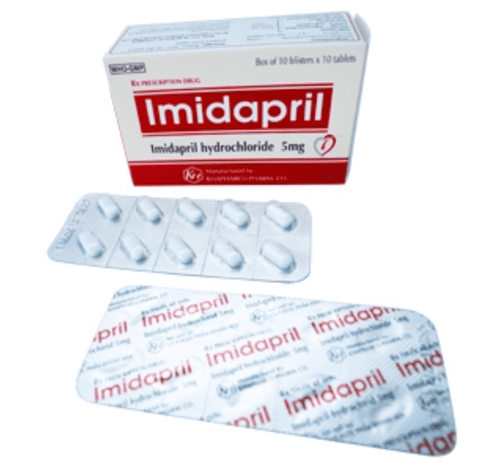This is an automatically translated article.
Cardedes drug is used alone or in combination in the treatment of hypertension,...Let's learn about the uses and notes when using Cardedes through the article below.1. Uses of the drug Cardedes
Cardedes medicine contains the active ingredient Candesartan Cilexetil 8mg which is made in the form of tablets. Candesartan acts by blocking the angiotensin II receptor. Candesartan acts on blood vessels to lower blood pressure due to direct vasodilation, so it reduces peripheral vascular resistance, dilates peripheral sympathetic tone, reduces the release of Nor-adrenaline from the adrenal medulla, and reduces the release of Vasopressin. from the pituitary gland and reduce the response of blood vessels to vasoconstrictor substances such as Nor-Adreanalin, Vasopressin. Cardiac effects of Candesartan reduce myocardial contractility, decrease heart rate by reducing sympathetic tone, and reduce ventricular hypertrophy and fibrosis.Cardedes drug is indicated in the following cases:
Treatment of hypertension, used alone or in combination with other drugs; Treatment of heart failure in patients with left ventricular systolic dysfunction.
2. Dosage of the drug Cardedes
Cardedes used to treat hypertension belongs to the group of prescription drugs, so the dose of the drug used is prescribed by the doctor based on the patient's condition. Some recommendations for Cardedes dosing are as follows:The recommended starting dose is 16 mg/day as monotherapy in patients who are not volume-depleted. Maintenance dose is 8mg/day or can be increased to 32mg/day for 1 time use or divided into 2 times/day; In case the patient cannot control blood pressure, it is possible to use a combination of diuretics and other antihypertensive drugs; No dose adjustment of Cardedes in elderly patients, patients with mild hepatic impairment and mild renal impairment; The recommended starting dose in volume-depleted patients is 4 mg once daily; The recommended starting dose in the treatment of heart failure is 4 mg once daily. Dose may be considered doubled to achieve the goal of 32 mg once daily if tolerated. Note that the above dose of Cardedes is for reference only, patients need to use the drug exactly as prescribed by their doctor.
3. Cardedes . side effects
Cardedes drug can cause some side effects as follows:
Whole body: Fever, body weakness; Nervous system: Dizziness, paresthesias; Digestive system: Gastroenteritis, dyspepsia; Heart rate: Palpitations, tachycardia; Metabolism and nutrition disorders: Hyperglycemia, increased creatinine phosphokinase, hypertriglyceridemia, increased blood urea; Musculoskeletal disorders: Myalgia; Blood clotting disorders: Nosebleeds ; Nervous disorders: Nervous breakdown, anxiety, lethargy; Respiratory disorders: Shortness of breath; Skin - soft tissue disorders: Excessive sweating, rash; Uncommon side effects: Angina pectoris, myocardial infarction, angioedema; Very rare side effects: Liver dysfunction, hepatitis, neutropenia, agranulocytosis, renal failure, hyperkalemia, hyponatremia. Patients should inform their doctor if they experience side effects during treatment with Cardedes.
4. Notes when using the drug Cardedes
4.1. Contraindications
Contraindicated to use Cardedes drug in the following cases:
Patients with hypersensitivity to Candesartan or any component of Cardedes drug; Patients with cholestasis or severe liver failure.
4.2. Use caution
Risk of excessive hypotension during treatment with Candesartan in salt-depleted, volume-depleted patients. Therefore, patients should be treated for symptoms of salt loss before taking the drug. In case of hypotension, the patient should be placed in the supine position, if necessary, physiological saline can be given intravenously. Renal Impairment: Because of the inhibitory effect on the Angiotensin-Aldosterone system of Candesartan, caution should be exercised in altering renal function in susceptible patients to treatment with the drug. For pregnant women: Treatment with Candesartan in the second and third trimesters of pregnancy can have a direct effect on the renin-angiotensin system, causing harm and death to the fetus. Therefore, the use of Cardedes is contraindicated in pregnant women. For lactating women: Candesartan is not known to be excreted in human milk, however animal studies have shown that it is excreted in the milk of rats. Therefore, the use of Cardedes is contraindicated in lactating women. For drivers, operating machines: Candesartan can cause neurasthenia, dizziness, drowsiness, so it should be used with caution when driving or operating machinery.
5. Drug interactions
Cardedes drugs can cause some of the following drug interactions:
Use caution when using Candesartan with drugs that increase blood potassium levels such as potassium supplements, Spironolactone; Concomitant use of Candesartan and Lithium increases blood levels of Lithium. The occurrence of drug interactions increases the risk of having an effect and reducing the treatment effect of Cardedes, so to ensure safety and effectiveness in treating patients, it is necessary to inform the doctor about the drugs and foods that are being used. used before taking Cardedes.













